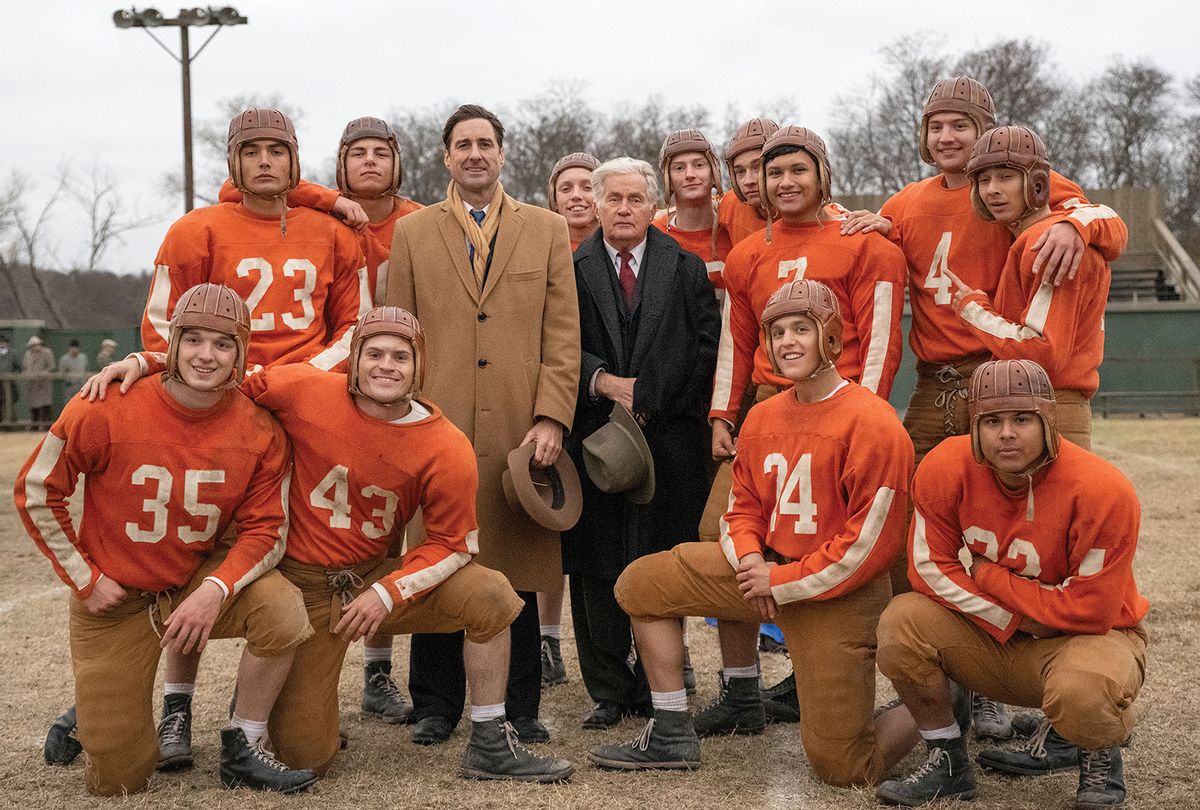Around the midpoint of the earnest, inspirational sports drama, "12 Mighty Orphans," Doc Hall (Martin Sheen) describes the orphans — a Depression-era Texas interscholastic high school football team — as, "the classic underdog story common folks could get behind." This line emphasizes everything that is both right and wrong with director Ty Roberts' wholly mediocre film. It is impossible not to root for this scrappy ragtag team of orphans (resistance can be futile), but this statement, spoken in a didactic voiceover, full of aw-shucks sentiment and syrup, is both obvious and unnecessary.
"Inspired by true events," and based on the novel by Jim Dent, "12 Mighty Orphans" has Rusty Russell (Luke Wilson) arriving at the Masonic Home in Fort Worth, Texas with his wife Juanita (Vinessa Shaw), and their young daughter Betty (Josie Fink). At the same time, troubled teenager Hardy Brown (Jake Austin Walker) is brought into the orphanage, his father has died, and his mother is gone. Rusty has come to teach math and science and coach football; Juanita will teach English and music. Frank Wynn (Wayne Knight), manages the orphanage with a firm hand and a paddle named "Bertha" that he uses to keep the boys in line. Frank also runs a printing plant at the school, which violates many child labor laws.
Rusty, of course, is an honest, upright man and he befriends Doc who helps him manage the football team. Most of the boys have never played football, much less held a pigskin. They don't even have shoes. Thus begins Rusty's dogged efforts to make something out of these troubled youths. He starts espousing stories of belief and self-respect to win them over. Rusty confesses that he, too, is an orphan, and a veteran. Unnecessary flashbacks triggered by his experiences with the teens recount his tragic backstory. Rusty talks about "hope" so much it sounds like an Obama speech. The film is so damn saccharine one might check the label to see if this is Disney pabulum. (Oddly, the distributor is Sony Pictures Classics).
It would be easy (and not inexcusable) to give up on "12 Mighty Orphans" in its first half hour. When Doc tells Rusty, "The best horses are the hardest to break" — referring to Hardy Brown who doesn't hide his anger — viewers might put up their arms in reflex to brace against being cudgeled. Moreover, there are plenty of remarks about the orphans being feared and stigmatized, misfits and outcasts, as well as second-class citizens. Rusty and Juanita talk about having a "chance to make a real difference," because life inside the Masonic Home, a "cold, uncaring institution," is said to hold "very little promise." The filmmakers clearly think it is no use to say something once when three times will do.
However, "12 Mighty Orphans" hits its stride once the orphans get to play their first game. That said, this is after Rusty takes care of getting the Masonic Team admitted into the league, and the cliched montages of the teens "learning" so they can pass the educational requirement to play, and their practicing, badly, on the field. The first game is against Polytechnic, coached by Luther (Lane Garrison, who co-wrote the screenplay), who always has a cigar in his mouth (that's a clue for villainous). To call the game a "David vs. Goliath" match, which the film, of course, does, is to state the obvious. Meanwhile, Rusty speechifies about "heart, focus, and conviction," something Ty Roberts' film has in abundance.
The game is a washout, but soon Rusty, with the help of his precocious daughter, Betty, develops an innovative new formation that starts to turn the team's fortune (and the film) around. It is entertaining to watch the Mighty Mites — as they are soon dubbed — start winning. The boys begin to develop the sense of confidence and brotherhood that Rusty repeatedly promised them. The team is so winning that the film's lapse into outright melodrama — when the mother of an orphan returns for her son — is forgivable.
That said, a subplot involving Frank trying to destroy the team's chances, because he greedily wants the child labor, is pretty awful; it is depicted with the subtlety of Bertha. The attempt to disqualify the team, which has — spoiler alert, won the regional semifinals — features what may be the film's hokiest bit: a call from President Roosevelt (Larry Pine).
However, "12 Mighty Orphans" saves its biggest, emotional moment for a rousing halftime speech Hardy gives during an important game. It is the kind of scene designed to be projected on jumbotrons during local sports games. And Jake Austin Walker, the film's breakout player, delivers it with gusto. It may be absolute hokum, but it works.
Luke Wilson is perfectly adequate in his role as Rusty, a man whose contributions to football are worth documenting. But it is Martin Sheen, who steals the film as Doc. And he even gets a scene that reunites him with his "Apocalypse Now" costar, Robert Duvall, who plays an Orphans supporter.
"12 Mighty Orphans" is a feel-good football film. It's just not very good. But at times, it is good enough.
"12 Mighty Orphans" opens nationwide on Friday, June 18.

Shares